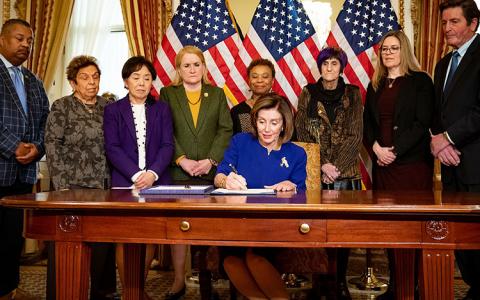
The three months of squabbling over a new round of virus relief moved no closer to a resolution over the weekend, all but extinguishing the prospects of a stimulus bill being written, voted on, and signed into law by President Donald Trump before the election.
House Speaker Nancy Pelosi said she’s waiting for another counteroffer Monday from Treasury Secretary Steven Mnuchin, as she and White House Chief of Staff Mark Meadows accused each other of “moving the goalposts” in negotiations.
Much of the weekend was devoted to work by congressional committees with the goal of writing legislation, but aides in both parties said little progress was made despite the pledges from both sides that they want to quickly deliver $1,200 stimulus payments to most Americans along with aid to struggling businesses.
The Senate is set to leave Washington on Monday after voting on the confirmation of Supreme Court nominee Amy Coney Barrett, and the House is already out. Both chambers could be called back for a vote with 24 hours notice, though that scenario is unlikely in the last week of campaigning before the national election.
Pelosi said Sunday on CNN that she sent Mnuchin a “list of concerns” on Friday, some related to a strategy to combat the spread of Covid-19. Democrats have sought language limiting Trump’s ability to divert testing and treatment funds to other purposes.
“My understanding is he will be reviewing that over the weekend and we will have some answers on Monday,” she said.
The view at the White House was increasingly pessimistic. Meadows said Sunday that Pelosi has failed to make the compromises necessary to seal a deal.
“We continue to make offer after offer after offer, and Nancy Pelosi keeps moving the goalposts,” he said on CNN.
Read More: Time to Reset Expectations for World Economy With Virus Untamed
Republicans in the Senate remain an obstacle. Meadows said the administration can’t say whether 13 Republicans senators -- the minimum necessary to get a bill to the Senate floor -- would support a deal until one is reached.
“Obviously we’ve identified those Senate Republicans most likely to vote for it,” Meadows said on Sunday. “I do have a commitment from Leader McConnell that if we have an agreement, he’s willing to bring it to the floor and get it passed.”
Both sides have political incentives to at least appear to be talking since walking away from the table only invites blame before the election. After Trump in early October called a halt to stimulus talks on Twitter, he promptly reversed himself after feeling political heat and seeing a drop in U.S. equity markets.
The White House has increased its stimulus proposal from roughly $1 trillion to nearly $1.9 trillion in the last month, closer to the $2.4 trillion bill passed by House Democrats. The major sticking points continue to be Democratic demands for nearly $500 billion in aid to cash-strapped state and local governments, and the Republican drive to protect companies from lawsuits related to the pandemic.
Pelosi has hinted at a compromise on liability whereby companies following strong government Covid recommendations could claim compliance as a defense in civil lawsuits by employees. And Meadows has suggested the differences on state and local aid could be resolved by directly earmarking funds for transportation or private-sector job creation.
Hopes Fade
The slow pace of the talks has lawmakers looking at the lame duck session of Congress in November and December. Congress is already facing a Dec. 11 deadline for an agreement to fund the government and avoid a shutdown before the holidays.
Senator John Thune of South Dakota, the No. 2 Republican leader, told reporters in the Capitol Sunday that he has some confidence an economic relief bill can be agreed to after the election, which will decide control of the White House and both houses of Congress.
“The prospects will improve after the election once we get past the current unpleasantness that we go through every even numbered year,” said Thune. “There’s a whole range of things that we all agree on. And I don’t know why we can’t at least do that. And then if they get the majority, they can come back later. If they don’t, and we are still in the majority, then I suspect there’s more interest in trying to get a deal.”
This article originally appeared on Bloomberg.



